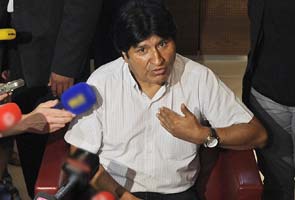
France and Portugal refused air permits to the plane of Evo Morales, President of Bolivia because they reportedly suspected it was carrying Edward Snowden, the former US spy agency contractor wanted by Washington on espionage charges, the Bolivian government has said. The plane was then forced to land in Austria.
Bolivian Foreign Minister David Choquehuanca on Tuesday furiously accused France and Portugal of putting Morales’ life at risk and insisted that Snowden was not on Morales’ plane.
Choquehuanca told reporters that Portugal and France had abruptly cancelled the air permits, forcing the unscheduled Vienna stopover as Morales was returning on a Bolivian government aircraft from Russia.
“They say it was due to technical issues, but after getting explanations from some authorities we found that there appeared to be some unfounded suspicions that Mr Snowden was on the plane … We don’t know who invented this lie,” he said.
“We want to express our displeasure because this has put the president’s life at risk.”
While attending an energy conference in Russia this week, Morales said he would consider granting asylum to Snowden if requested. His speech was apparently what called for suspicion.
Bolivian Defense Minister Ruben Saavedra said the US State Department may have been behind the decisions to not allow Morales’ plane to land in Portugal or fly over French air space.
“We have the suspicion that they (the two European governments) were used by a foreign power, in this case the United States, as a way of intimidating the Bolivian state and President Evo Morales,” he said.
The whole world seems to be against Snowden who is fast running out of options as countries in Latin America, Asia and Europe have spurned his asylum requests despite a call by Venezuela for the world to protect the former US spy agency contractor.
Snowden who revealed the secret US electronic surveillance programme, PRISM, has applied for political asylum in more than a dozen countries in his search for safety from prosecution in the United States, but none has given him a green light.
The 30-year-old American is in legal limbo in the transit area of Moscow’s Sheremetyevo airport, unable to fly out because he has no legal travel documents and also has no Russian visa to leave the airport.
Russia would have been a go for him after Russian President Vladimir Putin said he could stay provided he was going to stop publishing further US secrets, saying Snowden should stop “harming our American partners”. Snowden however blew that chance on Monday after breaking a nine-day silence since arriving in Moscow from Hong Kong, challenging Washington by saying he was free to publish more about its programmes and that he was being illegally persecuted.
But while country after country denied his asylum requests on technical grounds, Venezuela, part of an alliance of leftist governments in Latin America, said it was time to stop berating a man who has “done something very important for humanity”.
“He deserves the world’s protection,” President Nicolas Maduro told Reuters during a visit to Moscow for a meeting of gas exporting countries.
“He has a right to protection because the United States in its actions is persecuting him … Why are they persecuting him? What has he done? Did he launch a missile and kill someone? Did he rig a bomb and kill someone? No. He is preventing war.”
Maduro said he would consider an asylum application. He later had talks with Putin but neither leader said whether they had discussed Snowden.
Snowden’s request for safety in Ecuador, which has sheltered the founder of antisecrecy group WikiLeaks Julian Assange in its London embassy for more than a year, has seemingly ended as Ecuador’s President Rafael Correa said on Sunday that Snowden’s fate was in Russia’s hands because Ecuador could not consider the plea until he reached his country’s territory or one of its embassies.
Bolivian President Evo Morales, also in Moscow for the gas conference, told Russia’s RT television that his country would consider an asylum request but had not yet received one.




